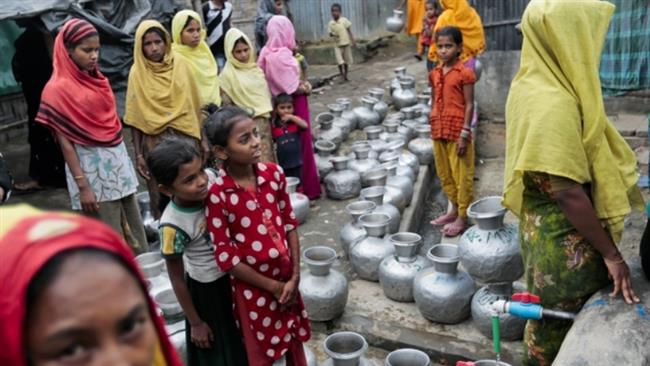
RNA - The Associated Press on Monday published interviews with Rohingyas, who have escaped to Bangladesh from Myanmar, with some of them describing cases of rape and murder back in their home country.
“They drove us out of our houses, men and women in separate lines, ordering us to keep our hands folded on the back of our heads,” said 20-year-old Mohsena Begum, recalling what had happened to the little village of Caira Fara, where hundreds of members of Myanmar’s minority community of Rohingya had been living until the government began a new wave of crackdown against the Muslims in October.
Begum said the forces and a group of local Buddhist men gathered together about 50 Rohingyas and then pulled four village leaders from the crowd and slit their throats.
Caira Fara is located in Rakhine, a western state of Myanmar which borders Bangladesh. The military crackdown on the Rohingyas began after the government in October accused the Muslims of carrying out attacks on guard posts near the Bangladesh border.
Nine police officers were killed in the attacks. The allegation against the Rohingyas comes as the government has yet to make clear the identities and motives of the perpetrators.
The Rohingyas have no militant faction to fight for them but police in Myanmar and Bangladesh have blamed a number of attacks in the past on the Muslims.
The government also insists that stories like that of Begum are pure exaggerations.
Begum says there is no need for exaggeration as what happened in Caira Fara was a massive ordeal. She recounts how her husband was killed in the violence that followed the beheading of the village leaders while she herself was raped after soldiers knocked her young son from her grasp.
She then ran with her son into the nearby hills and then paid smugglers to get her and her son into Bangladesh.
The violence in recent months has prompted some 15,000 Rohigyas to escape Rakhine into Bangladesh.
Extremist Buddhists claim that minority Rohingyas are illegal migrants and should be deported to Bangladesh. Leaders of the Muslim community, however, cite numerous international documents proving that Rohigyas have lived in Rakhine for generations.
Former United Nations Secretary General Kofi Annan, who has been tasked with heading a commission to investigate the situation in Rakhine, arrived in the state on Friday to pay a visit to the violence-hit areas. He is planned to hold a press conference on Tuesday in Myanmar’s biggest city, Yangon.
847/940